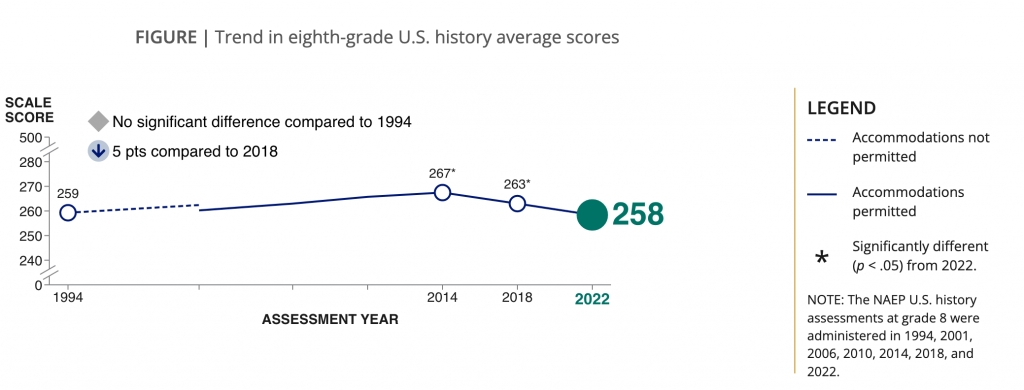Last week, Education Week published my response to the recent NAEP scores which showed a decline in students’ understanding of both American History and Civics. They summarized my article succinctly: History Teachers Deserve Respect. I’d like to nuance this slightly to say that “The Discipline of History Demands Respect.” Please read an excerpt below, and then head over to Education Week to read the full article.

Trend in eighth-grade U.S. history average scores (https://www.nationsreportcard.gov/ushistory/)
“The National Assessment of Educational Progress released the 2022 scores in history and civics for 8th graders earlier this month. I cannot say I was surprised by the decline. As others have noted, decreased time spent on social studies, a lack of funding, and recent state legislation prohibiting the teaching of a full and honest history were likely contributing factors.
I’d like to make the case that each of those causes represent a larger issue worth addressing: the lack of respect or attention to history education. This lack of respect permeates school buildings in how tests are built, professional development is allotted, teacher bonuses are awarded, and teaching assignments are given.
…
Most people do not actually see history as a discipline. They see it as a content. This distinction is crucial. When we only see history as a content of stories to be told, we get lost in the weeds of which stories to choose. The ongoing culture wars over what we can teach in history classrooms illustrates how this quickly spirals out of control. Rather than having constructive conversations about competing interpretations of the past, many people have become dogmatic about particular narratives, distracting us from the disciplinary practices inherent to the study of history.
…
If we truly care about equipping the next generation of citizens to be proficient in history and civics, we need to start by redefining what it is we do as history teachers. Of course, as I often tell the teachers I coach, this does not mean that we get rid of content in favor of skills, but it does mean that content becomes a means to an end—to the loftier goal of empowering our students to think historically.
…
We must… cultivate historical thinkers, empowered to engage with the diversity of ideas that they encounter both in and out of our classrooms.
To do this effectively, we need to build a common language around how we think about history so that social studies teachers don’t just have surface-level conversations about student progress within their content silos. We also need to provide common assessments on historical thinking that facilitate the use of that common language.
…
We can bring legitimacy back to what we do. Focusing on the discipline rather than the content allows us to rise above the culture wars, redeem ourselves as teachers of literacy so that we can properly collaborate with other content areas, and, most importantly, empower our students with the skills and dispositions to reinvigorate a visibly injured democracy.
As a bonus? Yeah, the NAEP scores will increase, too.”